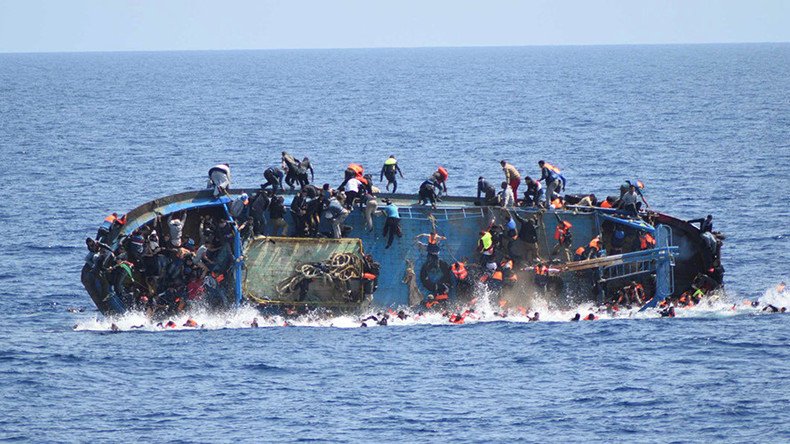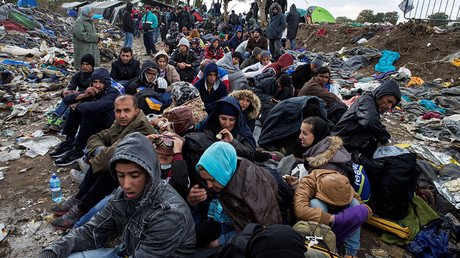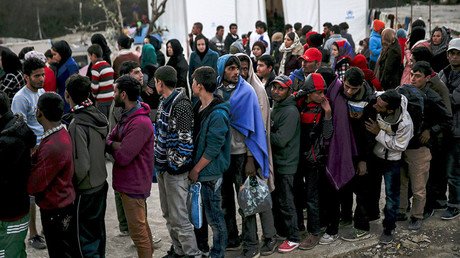Fly to Europe: German NGO wants to help refugees reach EU by plane

A newly-registered German NGO wants to transport refugees from North Africa and the Middle East into Europe via planes instead of highly dangerous sea routes. Organizers plan to raise money for plane tickets and amend an EU directive that fines airlines for ferrying migrants.
“Let’s Fly 2 Europe” is a new non-governmental organization based in Germany that recently registered in Brussels.
“Every human has the right to apply for asylum. Our initiative turns that theoretical right into a realistic chance,” the website description of the NGO states.
“No human should drown in the Mediterranean Sea. Refugees should be granted an option for safe and legal entry into Europe,” the description reads.
The group was founded by two German students attending a politics course at Tübingen university in central Baden-Württemberg, Germany. Matheus Meinlschmidt and Markus Jaggo, both 24-years-old, say the aim of the organization is to gather donations from German citizens and all sympathizers to fly migrants from the war-torn regions in North Africa and the Middle East directly to Germany.
There is one major obstacle to the group’s idea, though, that is EU Directive 2001/51/EC, dating back to 2001. It obligates transport corporations to finance deportation procedures in cases when asylum applications are denied.
“If the application for asylum is rejected, the transport company is obligated to organize the return of the asylum seeker [to his homeland] and pay a fine of at least 3,000 euros,” Markus Jaggo told Deutschlandfunk news outlet.
The group wants the directive to be amended, granting airlines the opportunity to bring them in. Yet in order to do this, the NGO must engage members from seven European countries, so that they can request a hearing on the matter in the European Parliament. According to Jaggo, three countries so far have supported the group’s initiative: Greece, Italy and Spain. They are actively recruiting supporters among other organizations and individual citizens.
“We demand an alteration to EU Directive 2001/51/EC, to the effect that the responsibility for refugees entering the EU via airplane or ship no longer lies with corporations, but instead with the [European Union],” the NGO states.
Among the positive effects the initiative may bring about, a decrease in the numbers of refugees that die on their way to Europe was placed at the top of the list. According to the latest UN figures, 3,167 people died or went missing crossing the Mediterranean to Europe so far this year, making the first half of 2016 the deadliest on record. It exceeds last year’s figure of 1,917 people, despite the total number of people who undertook the journey being four times less this year. As of August 24, more than 270,547 migrants entered Europe by sea since the beginning of 2016 (1,015,078 last year).
The group states that the measure may stop human smuggling and trafficking, which have been the main means of passage for many asylum seekers.
Meanwhile EU member-states have been increasingly seeking a means by which to curb the influx of refugees, unable to cope with the numbers. While Germany has been pushing for migrant quotas to distribute newcomers throughout the union, Poland, Slovakia, Czech Republic and Hungary recently took turns expressing their opposition to the measure, saying that their “capacities and capabilities” in that regard are limited. Austrian Defense Minister Hans Peter Doskozil went further, slamming Germany’s “welcoming” approach towards migrants as “irresponsible.”
READ MORE: Rising fear of terrorism pushes Europeans to rethink approach to right-wing parties
Germany’s refugee policy, or that of Chancellor Merkel’s government, has been taking its toll on the country itself, with an increasing number of politicians speaking out against Merkel’s ‘we can do it’ approach. The Chancellor’s popularity with the electorate has also been rapidly sinking, especially after July’s attacks targeting German citizens, some of which were claimed by Islamic State (IS, formerly ISIS/ISIL) terror group. With these attacks in mind, the public in Germany and the rest of the EU has been searching for alternate measures to curbing the influx – and the terror threat which is now inseparable from it. The search has pushed many to reconsider attitudes towards right-wing parties, whose ratings have been steadily rising lately.














